Key takeaways:
- Eco-friendly products prioritize environmental sustainability and ethical manufacturing, offering consumers a way to align their purchases with their values.
- Sustainability in fashion promotes high-quality, lasting pieces over fast fashion, fostering community connections and empowering individual choices.
- Support for eco-friendly brands often coincides with feminist values, such as promoting female artisans and advocating for transparency in the supply chain.
- Personal experiences with sustainable choices highlight the emotional connection to eco-friendly products and their positive impact on the environment.
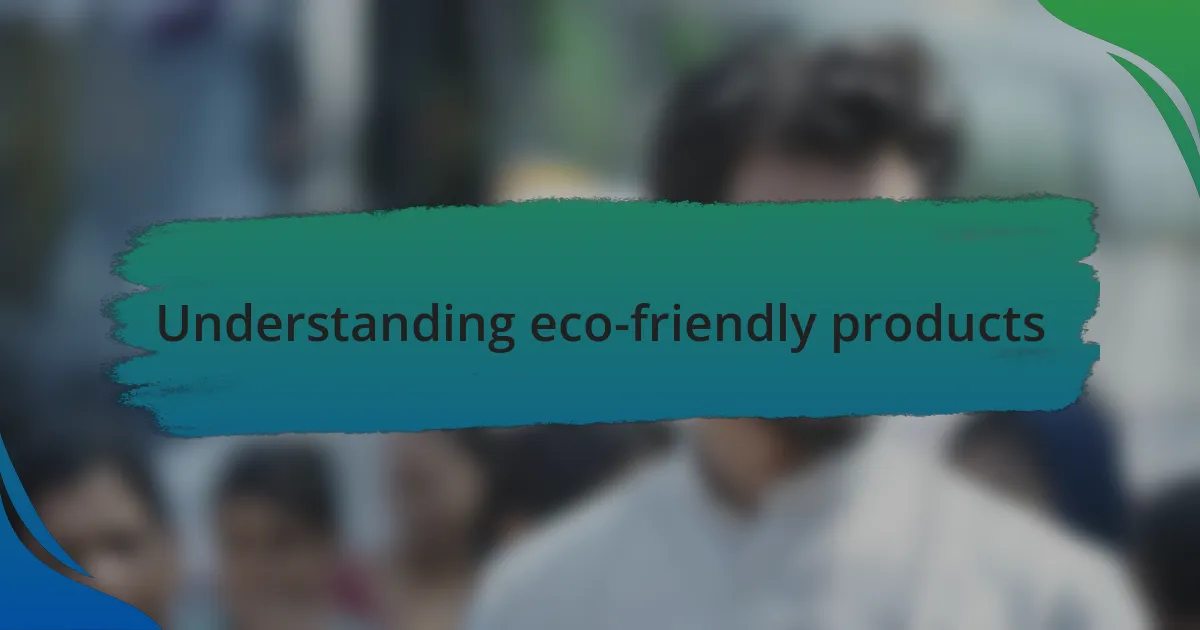
Understanding eco-friendly products
Eco-friendly products are designed to minimize harm to the environment, often using sustainable materials and ethical manufacturing processes. I remember the first time I switched to a bamboo toothbrush; it felt good knowing I was taking a small step toward reducing plastic waste. Does anyone else feel a sense of satisfaction when making choices that align with their values?
These products often reflect a commitment to social responsibility as well as environmental consciousness. I once attended a fashion show where all the garments were made from recycled materials. It struck me how creativity could intersect with sustainability, sparking conversations about our role as consumers. Isn’t it refreshing to see fashion that tells a story of care for the world we live in?
When considering eco-friendly options, it’s essential to look beyond just the label. I often find myself researching brands to understand their practices–are they transparent about sourcing? What was their journey to becoming sustainable? These questions deepen my appreciation for the products and reinforce my commitment to making conscious choices. Wouldn’t you agree that it’s crucial to support businesses that genuinely prioritize our planet?
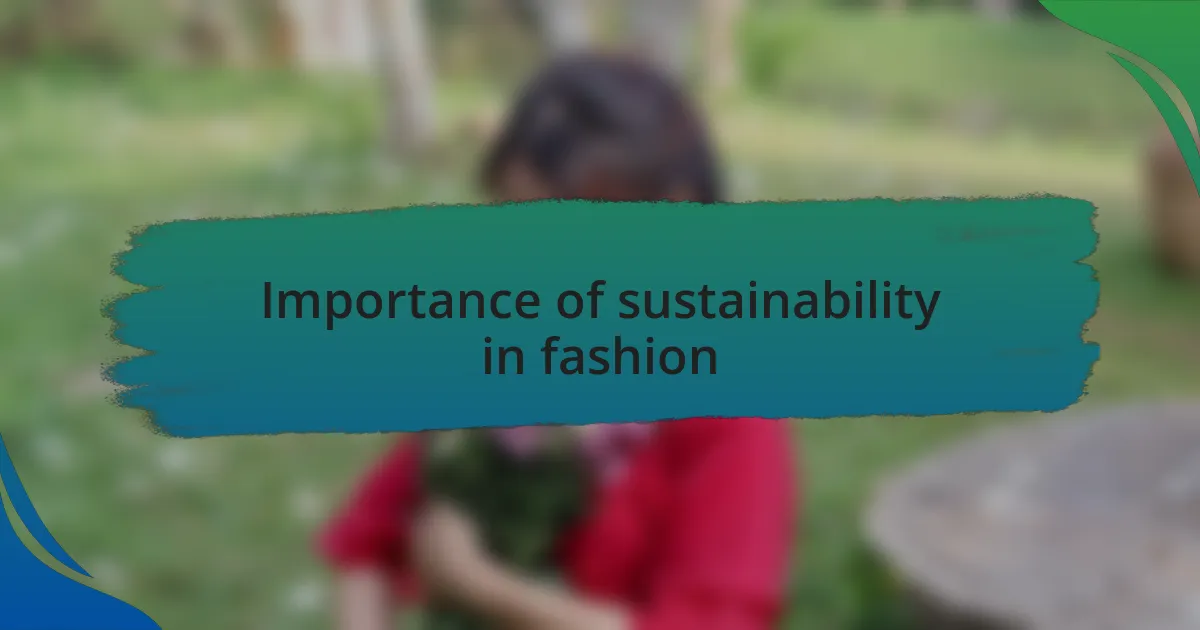
Importance of sustainability in fashion
Sustainability in fashion is not just a trend; it’s an essential approach that challenges the traditional models of consumption. I recall the excitement I felt when I discovered a brand that used organic cotton for its clothing. Knowing that my purchase supported farming practices that were better for the Earth made me realize how impactful our choices can be. Don’t you feel empowered when you know your wardrobe reflects more than just your style?
The significance of sustainable practices extends to the life cycle of a garment. When I learned about the water waste generated by fast fashion, I was shocked. It made me reconsider how often I buy new clothes. Reflecting on these habits can be a real eye-opener, prompting us to invest in high-quality pieces that last, rather than fleeting fashions that ultimately contribute to environmental degradation. Isn’t it better to cherish what we have rather than chase an endless cycle of consumption?
Moreover, sustainability fosters a sense of community within the fashion industry. After joining a local swap event, I met so many like-minded individuals who also prioritize eco-conscious choices. Sharing clothes and stories about our favorite sustainable brands brought a new depth to my understanding of fashion. It’s fascinating how our choices can create connections and influence change, don’t you think?
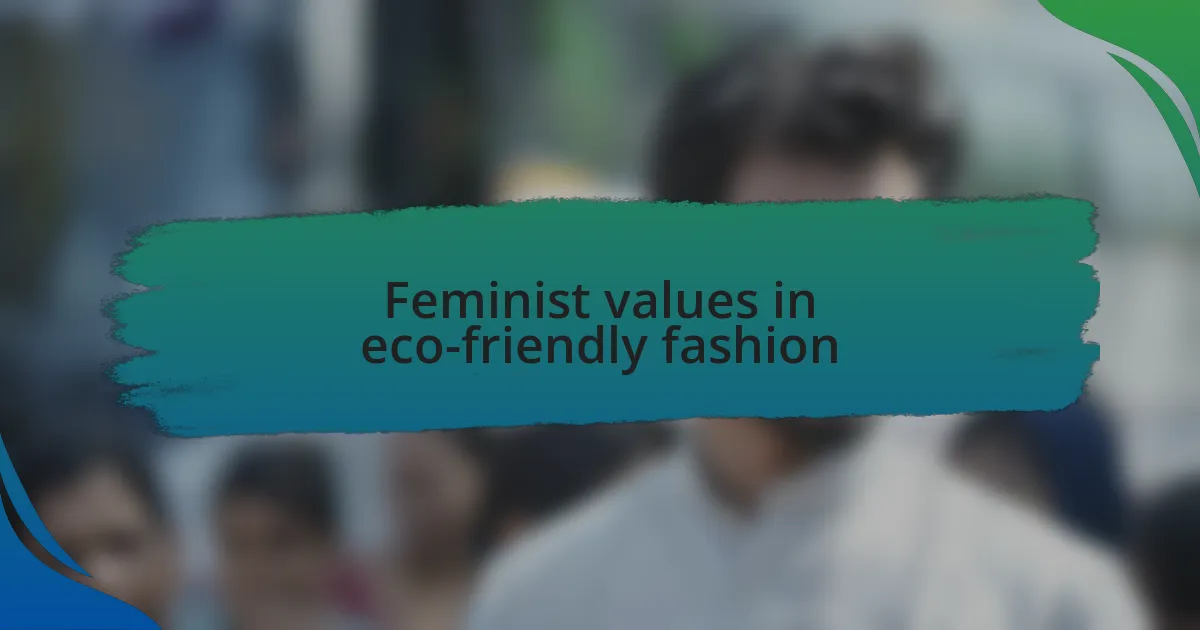
Feminist values in eco-friendly fashion
Engaging with eco-friendly fashion doesn’t just align with environmental concerns; it’s also deeply rooted in feminist values. I remember attending a workshop where we discussed the importance of supporting female artisans and brands led by women. Knowing that my choices can empower other women in the industry feels incredibly fulfilling, right? By choosing brands committed to sustainable practices, we’re also promoting equality and giving visibility to women’s work.
Moreover, the inclusivity of eco-friendly fashion speaks volumes to feminist ideals. I once stumbled upon a brand that offered gender-neutral clothing made from recycled materials, which perfectly embodies the spirit of feminism. It struck me how fashion can break away from the restrictive norms that often dictate what women or men should wear. Isn’t it empowering to see styles that reflect individual identity rather than conforming to outdated stereotypes?
Finally, the transparency often found in eco-friendly brands resonates with the fundamental feminist principle of honesty and integrity. I vividly recall reading about a brand that openly shared their supply chain practices, which isn’t something I typically see in fast fashion. This commitment to ethical standards motivates me to support brands that align with my values, promoting not just a sustainable approach, but also a more equitable fashion landscape. Don’t you think transparency in the fashion industry is long overdue?
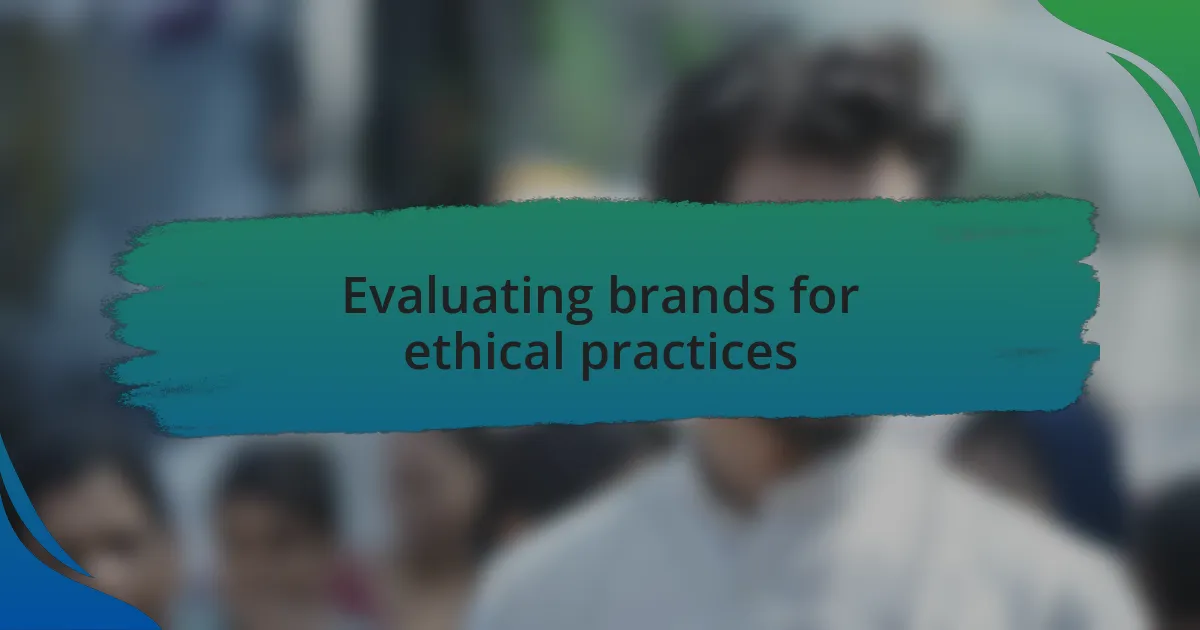
Evaluating brands for ethical practices
When evaluating brands for their ethical practices, I often look for the stories behind their creations. For instance, I discovered a small clothing line that sources materials from local artisans, and hearing the tales of these women’s craftsmanship made me appreciate my purchases on a deeper level. How can we ignore the human touch behind each piece when those stories add such rich context?
Another crucial aspect I consider is the labor conditions of workers. I once visited a workshop where a brand was producing clothing while ensuring fair wages and a safe environment for its employees. It’s refreshing to see how ethical practices can uplift communities. Do we really want to support brands that exploit labor under harsh conditions when alternatives that empower exist?
Lastly, examining a brand’s environmental impact can reveal much about its commitment to ethics. I came across a company that not only uses organic materials but also engages in reforestation efforts. It made me wonder how sustainability can be intertwined with social responsibility. Why should we settle for less when we have the power to choose brands that protect both people and the planet?

Personal experience with eco-friendly choices
Switching to eco-friendly choices in my wardrobe has been a transformative experience for me. I remember the first time I bought a pair of shoes made from recycled materials; the moment I slipped them on, I felt a sense of pride that sparked a change in my shopping habits. It made me question why I hadn’t made this switch sooner—was convenience truly worth the cost to our planet?
One memorable moment came when I attended a sustainable fashion event and spoke with a designer who used natural dyes. She shared her journey of combating fast fashion’s impact, and I couldn’t help but feel a wave of inspiration. It dawned on me that each eco-friendly choice I make contributes to a larger movement, making even small purchases feel impactful. Have you ever thought about how your choices resonate beyond just personal style?
The emotional connection I now have with my clothes is striking. Each time I wear a garment made from sustainable materials, I reflect on the positive change I’m supporting. It’s not just about looking good; it’s about feeling good knowing that I’m part of a solution. How could I go back to mindless consumption after experiencing this deeper relationship with my wardrobe?
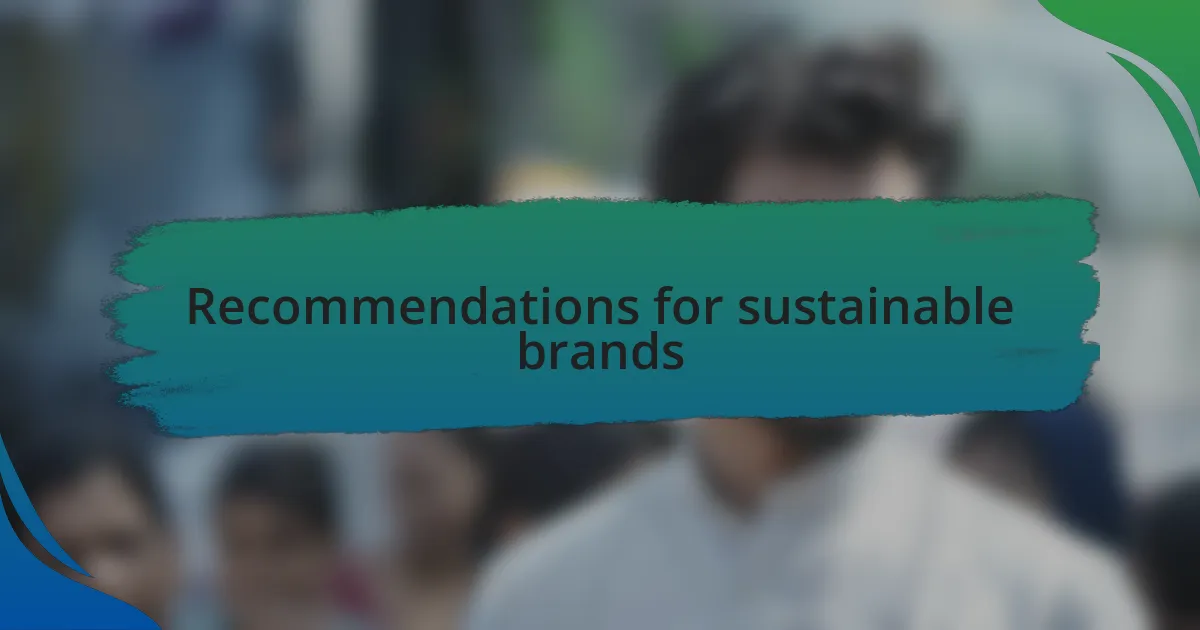
Recommendations for sustainable brands
When considering sustainable brands, I’ve found that companies like Reformation stand out for their commitment to both style and environmental responsibility. Their collections not only look fantastic but are made from eco-friendly materials, which makes my heart happy. Have you ever tried on a garment that felt as good as it looked? It’s a game-changer.
Another brand that caught my eye is Everlane, renowned for its transparency in pricing and commitment to ethical manufacturing. I remember ordering a pair of their denim; the fit was perfect, and knowing that my purchase supported fair labor practices made the experience even more satisfying. It sparked a thought—can ethical choices in fashion become the standard rather than the exception?
Lastly, I can’t help but rave about Patagonia. Their dedication to preserving our planet extends beyond just clothing; they actively promote sustainability initiatives. I once participated in a beach cleanup organized by their team, and it was eye-opening to see firsthand the impact of environmental efforts. It made me ponder—how often do we link our purchases with proactive change? Every time I wear my Patagonia jacket, I feel a tie to that mission, and it inspires me to seek out similar brands that align with my values.